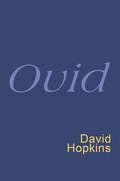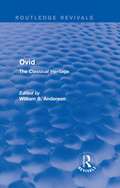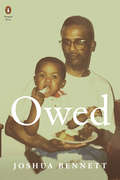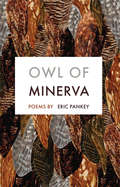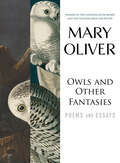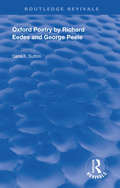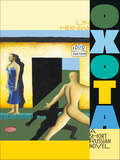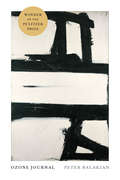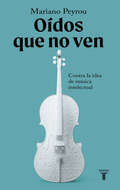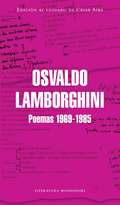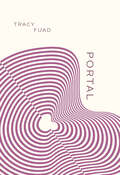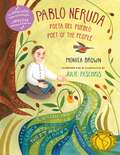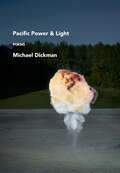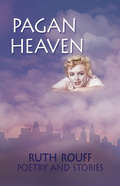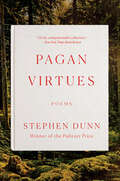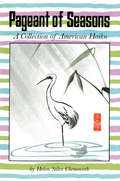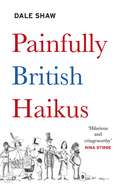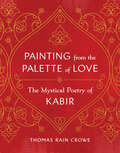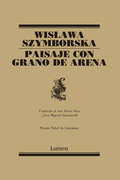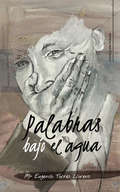- Table View
- List View
Ovid: Everyman's Poetry
by David Hopkins OvidRome's greatest poet, famous for his love elegies, and his narrative poem, "Metamorphoses".
Ovid: Metamorphoses
by Frank Justus Miller Ovid G.Ovid (Publius Ovidius Naso, 43 BCE-17 CE), born at Sulmo, studied rhetoric and law at Rome. Later he did considerable public service there, and otherwise devoted himself to poetry and to society. Famous at first, he offended the emperor Augustus by his Ars Amatoria, and was banished because of this work and some other reason unknown to us, and dwelt in the cold and primitive town of Tomis on the Black Sea. He continued writing poetry, a kindly man, leading a temperate life. He died in exile. Ovid's main surviving works are the Metamorphoses, a source of inspiration to artists and poets including Chaucer and Shakespeare; the Fasti, a poetic treatment of the Roman year of which Ovid finished only half; the Amores, love poems; the Ars Amatoria, not moral but clever and in parts beautiful; Heroides, fictitious love letters by legendary women to absent husbands; and the dismal works written in exile: the Tristia, appeals to persons including his wife and also the emperor; and similar Epistulae ex Ponto. Poetry came naturally to Ovid, who at his best is lively, graphic and lucid. The Loeb Classical Library edition of Ovid is in six volumes.
Ovid: The Classical Heritage (Routledge Revivals)
by William S. AndersonOvid: The Classical Heritage, first published in 1995, contains a diverse collection of reflections, ranging from the first century, through the Middle Ages, to the twentieth, on a poet who has been adored and reviled in equal measure. With the entire notion of ‘Western culture’ under duress, the need to establish continuity from antiquity to modernity is as pressing as ever. Each essay, selected by Professor Anderson, indicates an Ovidian theme or perspective which remains relevant to our self-understanding today. An enormous range of topics is investigated, in a variety of modes and styles: contemporary reaction, reception by Medieval Schoolmen, Ovid’s influence on Chaucer, and his importance for the ‘New Mythologists’. Overall, Ovid: The Classical Heritage offers a rich selection of essays, which cumulatively demonstrate the continuing importance and fascination of this great Roman poet.
Owed (Penguin Poets)
by Joshua BennettFrom "one of the most impressive voices in poetry today" (Dissent magazine), a new collection that shines a light on forgotten or obscured parts of the past in order to reconstruct a deeper, truer vision of the presentGregory Pardlo described Joshua Bennett's first collection of poetry, The Sobbing School, as an "arresting debut" that was "abounding in tenderness and rich with character," with a "virtuosic kind of code switching." Bennett's new collection, Owed, is a book with celebration at its center. Its primary concern is how we might mend the relationship between ourselves and the people, spaces, and objects we have been taught to think of as insignificant, as fundamentally unworthy of study, reflection, attention, or care. Spanning the spectrum of genre and form--from elegy and ode to origin myth--these poems elaborate an aesthetics of repair. What's more, they ask that we turn to the songs and sites of the historically denigrated so that we might uncover a new way of being in the world together, one wherein we can truthfully reckon with the brutality of the past and thus imagine the possibilities of our shared, unpredictable present, anew.
Owl of Minerva: Poems
by Eric PankeyA Walt Whitman Award–winning poet seeks the spiritual within everyday physical objects in this luminous collection.Taking its name from the Roman goddess of wisdom and her companion bird, Owl of Minerva turns astonishingly precise attention to the physical world, scouring it for evidence of the spiritual as the poet travels through such places as Appalachia, New England, Venice, Spain, the Caribbean, and the American Midwest. Along the way, Eric Pankey ponders mortality, religious narratives and iconography, the continued press of childhood on the present, and the simultaneous violence and beauty of the natural world.At the book’s core are three ambitious poems titled “The Complete List of Everything,” which together offer an extended vision of American longing and connection—as well as a window into the sort of compendium of images and moments a sustained devotion to poetry can yield. “The hope was to construct // A coherent totality of meaning from odds / And ends,” Pankey writes, and so much of this book is about the difficult work of constructing meaning from the available material all around us. This book is an extraordinary example of lyric-meditative journaling—a large and profound collection by a brilliant poet writing at the height of his powers.“Pankey remains one of our leading practitioners of the metaphysical poem.” —C. Dale Young, author of Prometeo
Owls and Other Fantasies: Poems and Essays
by Mary OliverA perfect introduction to Mary Oliver&’s poetry, this stunning collection features 26 nature poems and prose writings about the birds that played such an important role in the Pulitzer Prize winner&’s life. Within these pages you will find hawks, hummingbirds, and herons; kingfishers, catbirds, and crows; swans, swallows and, of course, the snowy owl, among a dozen others-including ten poems that have never before been collected. She adds two beautifully crafted essays, &“Owls,&” selected for the Best American Essays series, and &“Bird,&” a new essay that will surely take its place among the classics of the genre.In the words of the poet Stanley Kunitz, &“Mary Oliver's poetry is fine and deep; it reads like a blessing. Her special gift is to connect us with our sources in the natural world, its beauties and terrors and mysteries and consolations.&”For anyone who values poetry and essays, for anyone who cares about birds, Owls and Other Fantasies will be a treasured gift; for those who love both, it will be essential reading.This book was published with two different covers. Customers will be shipped the book with one of the available covers.
Oxford Poetry by Richard Eedes and George Peele (Routledge Revivals)
by Richard EedesPublished in 1995: The present volume contains two comparatively lengthy Latin hexameter poems that emanated from this circle. One is by Richard Eedes; the other is anonymous, although for the purposes of this book the author provisionally accepted Tucker Brooke’s attribution to George Peele.
Oxota: A Short Russian Novel
by Lyn HejinianOver the course of nearly a decade (1983–1991), author Lyn Hejinian visited the USSR seven times, staying frequently with her friends the poet Arkadii Dragomoshchenko and his wife Zina in Leningrad. During this period, she embarked on translating into English several volumes of Dragomoshcheko's poetry, and the two poets began an extensive correspondence, exchanging hundreds of letters until Dragomoshchenko's death in 2012. During her fifth visit, in conversation with Dragomoshchenko and other poets, she decided to write a novel reflecting her experiences of literary and lived life in Leningrad and Moscow. Cognizant of a general sense that the Russian novel is stereotypically "long," she determined that hers would be "short." What resulted is an experimental novel whose structure (284 chapters, each 14 lines long) pays homage to Alexander Pushkin's Eugene Onegin, which is generally regarded to be the first Russian novel: a verse novel composed in 14-line stanzas. From time to time, various members of Dragomoshchenko's circle of friends offered suggestions for the novel, as readers will note. There's abundant narrative content, but anecdotes and events are presented in non-linear form, since they unfolded over extended periods of time and thus came to Hejinian's attention piecemeal. Oxota (which means variously "huntress," "hunt," and "desire" in Russian) is a novel in which contexts, rather than contents, are kept in the foreground. Allen Ginsberg, who himself visited the USSR, did not like Oxota. He said that it wasn't realistic; Hejinian thinks that it is.
Ozone Journal
by Peter BalakianThe title poem of Peter Balakian's Ozone Journal is a sequence of fifty-four short sections, each a poem in itself, recounting the speaker's memory of excavating the bones of Armenian genocide victims in the Syrian desert with a crew of television journalists in 2009. These memories spark others—the dissolution of his marriage, his life as a young single parent in Manhattan in the nineties, visits and conversations with a cousin dying of AIDS—creating a montage that has the feel of history as lived experience. Bookending this sequence are shorter lyrics that span times and locations, from Nairobi to the Native American villages of New Mexico. In the dynamic, sensual language of these poems, we are reminded that the history of atrocity, trauma, and forgetting is both global and ancient; but we are reminded, too, of the beauty and richness of culture and the resilience of love.<P><P> Pulitzer Prize Winner
Oídos que no ven: Contra la idea de música intelectual
by Mariano Peyrou TubertUna mirada divertida y reveladora sobre la música que invita a la escucha libre, desprejuiciada y mucho más placentera de cualquier género musical. Este libro derriba con gracia y brillantez una idea que a menudo nos impide disfrutar abiertamente de ciertos géneros y obras: la idea de «música intelectual», que tan a menudo se interpone entre el oyente y el placer de la escucha. Además, ofrece algunas claves para que cualquiera pueda adentrarse en ciertas músicas supuestamente más impenetrables. Con un tono cercano, por medio de anécdotas divertidas y reveladoras y empleando un enfoque completamente alejado de lo académico, Peyrou plantea una serie de argumentos en contra de la noción de que ciertos estilos exigen una escucha intelectualizada. El libro, no obstante, desborda ese objetivo y se convierte en una lección sobre cómo funciona la música: cómo piensan los compositores y qué deseos los guían, en qué consiste la innovación y por qué encuentra tanta resistencia entre el público, qué tienen en común los diversos géneros y qué los diferencia, qué actitud es la más adecuada por parte de los oyentes. Relacionando músicas muy variadas (clásica y contemporánea, popular y folclórica, jazz, rock) pero también ideas procedentes del arte, la literatura, la filosofía y la antropología, el autor traza conexiones sorprendentes y propone una manera diferente de escuchar. La crítica ha dicho: «Libro a libro, ha renovado los modos del lenguaje y los enfoques de la mirada de una obra poética y narrativa tan personal como extrañamente prodigiosa».ANTONIO ORTEGA, Babelia «Esas raras veces en que el ingenio se acompaña de sustancia, el resultado puede ser fascinante. En ese momento es cuando yo dejo de llamarlo "ingenio" y lo llamo "talento"».SARA MESA, Estado Crítico «Su sentido del humor y su controlado gusto por la broma lingüística adquieren un feliz tono propio».NADAL SUAU, El Cultural «Innovador, ácido, lúdico, lúcido».ÁNGELES LÓPEZ, La Razón «Uno de nuestros grandes poetas del lenguaje».VICENTE LUIS MORA, Diario de Lecturas «Mariano Peyrou me parece un excelente escritor».JOSÉ MARÍA GUELBENZU «Una de las escrituras más personales y sorprendentes del panorama actual».LUIS BAGUÉ QUÍLEZ, Babelia «Uno de los narradores españoles más inteligentes en el juego con el lenguaje».EUGENIO FUENTES, La Nueva España «Dan ganas de anunciarle al lector que esto no es una novela. ¿Y esto es bueno o malo? En el caso del autor madrileño, es bueno. Muy bueno. Endiabladamente inteligente».J. ERNESTO AYALA-DIP, Babelia, sobre Los nombres de las cosas «Son muchas las cuestiones existenciales y artísticas que plantea Delos otros. Impulsada por un estilo introspectivo, con derivas en el flujo de la conciencia y diálogos con frases inconclusas. Peyrou sobrecoge al lector».FRANCISCO SOLANO, Babelia «Peyrou da rienda suelta a su aventura lingüística sin que la vanguardia desemboque jamás en gratuidad».JUAN ANDRÉS GARCÍA ROMÁN, Babab «No es una novela de humor, y sin embargo es divertida como pocas que haya leído en los últimos años».JUAN MARQUÉS, La Esfera de Papel, sobre Los nombres de las cosas
POEMAS 1969-1985 (EBOOK)
by Osvaldo LamborghiniGracias a César Aira, este libro reúne la obra poética de Osvaldo Lamborghini. No es probable que uno pueda encontrar en la poesía argentina de las últimas décadas una obra más consistente. A la inusitada y singular coherencia temática #que incorpora mitologías personales y dosis de poesía política, de psicoanálisis, de gauchesca, del surrealismo mejor asimilado# hay que añadirle la búsqueda formal de un escritor atento siempre a las inflexiones orales y a su propagación y combinación en la página. Desobediente a todo y a todos, el autor encuentra el poema #una desgracia pasajera# y lo convierte en un arma secreta. O lo somete a una violencia textual que poco tiene en común con las #transgresiones# de los escandalizadores profesionales. El poeta frente a su cuaderno con su caligrafía. Lamborghini vuelve real como ningún otro ese acto a la vez doméstico y perturbador. Ante esa materialidad a la vez suficiente y escasa, ante la repetición abstraída, el que escribe debe reaccionar cada vez de manera distinta. Para desconcertar, para prever un lector único al final de la oscuridad, para no encontrar la señal de consentimiento del #hombre de letras#. Generoso, fatal, imprescindible, Lamborghini se nos presenta como epítome y adalid del poeta sólo para inventarse en un más allá muy próximo #el encabalgamiento que falta# la identidad socarrona del que lee, entre líneas, esa carta de amor/odio que sólo el estilo hace posible. Una carta definitiva.
PORTAL (Phoenix Poets)
by Tracy FuadA poetry collection exploring inheritance and reproduction through the lenses of parenthood, etymology, postcoloniality, and climate anxiety. Tracy Fuad’s second collection of poems, PORTAL, probes the fraught experience of bringing a new life into a world that is both lush and filled with gloom. A baby is born in a brutalist building; the planet shrinks under the new logic of contagion; roses washed up from a shipwreck centuries ago are blooming up and down the cape. PORTAL documents a life that is mediated, even at its most intimate moments, by flattening interfaces of technology and in which language—and even intelligence—is no longer produced only by humans. The voices here are stalked by eco-grief and loneliness, but they also brim with song and ecstasy, reveling in the strangeness of contemporary life while grieving losses that cannot be restored. Through Fuad’s frank, honest poetry, PORTAL vibrates with pleasure and dread. Peeling back the surfaces of words to reveal their etymologies, Fuad embraces playfulness through her formal range, engaging styles from the tersely lineated to the essayistic as she intertwines topics of replication, reproduction, technology, language, history, and biology.
Paavendar Bharathidasanin Ethipaaratha Muttham
by BharathidasanComprises 32 chapters in two parts: The first part picturises the deep love of Ponmodi, the hero and Poongothai, the heroine which was opposed by the parents resulting in the hero’s exile to the north.Unable to bear the separation, Poongothai proceeds in search of her lover while he was on his way back home following the rift he had with a saint in the north. While both meeting surprisingly at a jungle she exchanged a kiss with her lover but unfortunately the hero was killed by a villain. She also dies. In the second part the author regrets the unending tears of the parents of the lovers.
Pablo Neruda: Poet of the People / Poeta del pueblo (Bilingual Edition)
by Monica BrownA new Spanish and English bilingual edition of the stunning picture book biography of Pablo Neruda, one of the world's most enduring and popular poets, from the acclaimed Monica Brown.Había una vez un niño llamado Neftalí, quien amaba las cosas salvajes locamente y las cosas tranquilas serenamente. Desde el momento en que aprendió a hablar, se rodeó de palabras. Neftalí descubrió la magia oculta entre las páginas de los libros.Cuando tenía dieciséis años, comenzó a publicar sus poemas bajo el nombre Pablo Neruda. Pablo escribió poemas sobre las cosas que amaba: obras creadas por sus amigos artistas, objetos hallados en los mercados y elementos de la naturaleza. Escribió sobre la gente de Chile y su lucha por salir adelante. Porque sobre todas las cosas y sobre todas las palabras, Pablo Neruda amaba a la gente.Once there was a little boy named Neftalí who loved wild things wildly and quiet things quietly. From the moment he could talk, he surrounded himself with words, seeking comfort and inspiration from the magic he discovered between the pages of books.When he was sixteen, he began publishing his writing as Pablo Neruda. Pablo wrote poems about the things he loved—things made by his friends in the café, things found at the marketplace, and things he saw in nature. He wrote about the people of Chile and their stories of struggle. Because above all things and above all words, Pablo Neruda loved people.With a new translation of Monica Brown's lyrical text and Julia Paschkis' gorgeous art, which celebrates multiple languages, this new edition will introduce the youngest of readers—of English, Spanish, and both—to the legacy of one of history's most iconic talents.
Pacific Northwestern Spiritual Poetry
by Charles PottsCharles Potts has assembled a number of very talented poets hailing (sort of) from the Pacific Northwest. Plenty of strastopherically high culture is here, experimentalism, pathos, insight too. An anthology of 50 poets.
Pacific Power & Light: Poems
by Michael DickmanThe award-winning poet returns to his homeplace in the Pacific Northwest, where the neighborhood simmers with the chemical presence of human trouble and sparks of beauty coexist with danger.This image-driven, sound-driven collection carries us to the working-class Portland neighborhood of Lents, where Dickman was raised by a single mother. Here, as a skateboarding boy practices his kickflip on the street, enlightenment simmers under the surface of both the natural world and the human constructions that threaten it. The rivers shrinking to a trickle, the unaddressed crisis of homelessness, the drug use in a local park: these run side by side with the efforts and structures of families, created mostly by working mothers, with their jumbled bottomless purses and full-time jobs; Dickman&’s own mother worked at the power company of the title, PP&L. His exquisite, ultrareal narratives take us down through these layers, illuminating the way we&’ve treated and should treat one another, seeking integrity and understanding in the midst of a broken world.
Pagan Heaven
by Ruth RouffWhere is Pagan Heaven? It's all around us. In our unceasing fascination with a movie star who died over half a century ago. In an inner-city youth who muses over the meaning of the word philosophy. In a statue of the Virgin Mary sitting atop a Coke machine. On a street where Walt Whitman once lived. On a lesbian-only cruise ship off the coast of Alaska. In an unusual melding of narrative poetry and spot-on prose, Pagan Heaven offers a wry take on the absurdities of modern American life, all the while celebrating human uniqueness whenever, wherever, and however it's found.
Pagan Virtues: Poems
by Stephen DunnPulitzer Prize winner Stephen Dunn returns with his signature morbid wit, intellectual daring, and emotive powers on full display. In this meditative and incisive collection, Stephen Dunn draws on themes of morality and mortality to explore the innermost machinations of human nature. Shifting in tone but never wavering in their essential honesty, these poems reflect on desire, restraint, and the roles we play in an ever-evolving society. In Pagan Virtues, Dunn reminds us of his penetrating eye for the universal and the specific, and his ability to highlight our contradictions with tenderness and wit. Two poems dedicated to Dunn’s eulogist, in advance, bookend the collection. The first introduces us to the poet’s sardonic candor and unflinching gaze at his own mortality, while the latter, written nineteen years later, reflects on what it means to continue to live in the “despoiled and radiant now.” A stunning sequence on the relationship between the speaker and “Mrs. Cavendish” examines an intimacy sustained and repelled by politics, philosophy, and attraction. Wry, observational, and wide-reaching, Pagan Virtues offers indispensable truths from a master of contemporary poetry.
Pageant of Seasons: A Collection of American Haiku
by Helen Stiles ChenowethThis is a collection of Japanese haiku written by an American poet Helen Chenoweth. The author has used a language that is all American in association, but very much enriched by her love for things Japanese."Poetry in Japan is as universal as air.<P><P> It is read by everybody, composed by almost everybody, irrespective of class and condition." This statement by Lafcadio Hearn deeply impressed Helen Chenoweth. In course of her comprehensive studies in the art of writing and teaching poetry, she became enchanted by the Japanese haiku, in which the subtlest meanings and feelings can be expressed in three short lines.Pageant of Seasons offers many lyrical haiku, some of which are centered around the Pacific Ocean. Other haiku show nature in all its facets of growing. These poems create a kaleidoscope of charming images and experiences to which each of us will attach his own meanings.
Painfully British Haikus
by Dale Shaw'Will make everybody laugh' DOLLY ALDERTON ON THE HIGH LOWEnjoy this hilarious collection of over 200 haikus that sum up the complex, confusing and often compounding character of the British people.The Sellotape endUnlocatable it seemsChristmas is cancelledHow many gin tinsIs decreed appropriate For this train journey? The sound of a splashMy Hobnob falls to piecesMy tea is sulliedEvery houseplantSuffers a slow painful deathI am a monsterYou're at the seasideA seagull eyes your MagnumYou won't win that fight
Painting from the Palette of Love: The Mystical Poetry of Kabir
by Thomas Rain CroweWrap yourself in the boundless love of the Divine with the mystical poetry of renowned Sufi saint Kabir, here brought to life for modern readers by acclaimed poet Thomas Rain Crowe.&“When you&’ve come all this way to the ocean of happiness, Do not return home thirsty with an empty cup. Wake up! Here is some pure water, Drink as much as you can!&”The enigmatic Indian mystical poet Kabir stands among the greatest spiritual thinkers of human history. At once a Sufi, Hindu, and unbounded disciple of the universal Divine, Kabir and his songs of union and ecstasy lead us beyond our preconceived biases about truth and reality—and invite us to see our life, through his eyes, as an ego-shattering and incomparably joyful dance with the Beloved. This 65-poem collection of Kabir&’s most rapturous spiritual songs, rendered into modern language by acclaimed poet and Sufi performing artist Thomas Rain Crowe, is brought to life in fresh, evocative language bursting with mystical power. Striking and profound, Crowe&’s inspired and poetic adaptations offer a sumptuous taste of true reality—beyond boundaries and in joyful embrace of life and our world.
Paisaje con grano de arena
by Wislawa SzymborskaPremio Nobel de Literatura La escritora polaca más reconocida junto a Ryszard Kapuscinski y a Stanislaw Lem. Amplia selección de la obra de Wislawa Szymborska, poeta polaca galardonada con el Premio Nobel de Literatura, Paisaje con grano de arena es el primer volumen poético de la autora que se publicó en lengua castellana. Los cien poemas recogidos en esta antología, autorizada por la autora, constituyen una excelente muestra del recorrido literario y temático de la poesía de Szymborska, una poesía que, según la Academia sueca, «mezcla la elegancia de Mozart con la pasión de Beethoven», y, en palabras de Czeslaw Milosz, premio Nobel de 1980, «es una lección de austeridad, ironía y simplicidad». Críticas:«Su poesía, con irónica precisión, permite que el contexto histórico y biológico surja a la luz en fragmentos de la realidad humana.»Acta del jurado del Premio Nobel «Algo único que había en ella era la mezcla de sentido de la tragedia y sentido del humor: sabía mirar la brutalidad del poder y también su ridículo, que tantas veces lo hace todavía más peligroso.»Antonio Muñoz Molina «Lo que tenían en común su obra y vida era un pertinaz y obstinado apego a la independencia.»Adam Zagajewski «Destacó por una poesía llena de humor y por su hábil juego de palabras. De ella se desprende una consideración antropológica basada en la finitud humana, en la debilidad del hombre frente a la naturaleza, con el hombre en el centro de sus interrogantes.»La Vanguardia
Palabras bajo el agua
by Mª Eugenia Torres LlorensDurante el año de mi profunda crisis personal guardé silencio y estuve en soledad. De la conjunción de estas dos bondades nacieron estos versos que he dado en llamar Palabras bajo el agua. Los sentimientos que invaden y conturban el alma pueden ser depositados en el papel y, mediante unos versos nacidos de la verdad, abrir el camino de la regeneración y el sosiego... de la paz interior.
